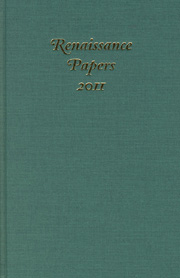Book contents
- Frontmatter
- Contents
- Dedication
- Walking, Waking, and the Armor of Light: Pauline Enactments in Henry IV, Part 1
- Costard's Revenge: Letters and Their Misdelivery in Love's Labour's Lost
- Productive Violence in Titus Andronicus
- Method in Marlowe's Massacre at Paris
- Ending Well: Mixed Genres and Audience Response in the London Theatrical Marketplace, 1604–06
- Birdlime: Sticky Entrapments in Renaissance Drama
- Sacrifice and Transcendence in Sir Philip Sidney's Astrophil and Stella
- The Quest for Certainty in Fulke Greville's A Treatie of Humane Learning
- Traces of the Masque in George Herbert's The Church
- Una Trinitas: Una and the Trinity in Book One of The Faerie Queene
- Reconsidering the 1599 Bishops' Ban on Satire
- Robert Bellarmine the Censor and Early-Modern Humanism
Sacrifice and Transcendence in Sir Philip Sidney's Astrophil and Stella
Published online by Cambridge University Press: 05 April 2013
- Frontmatter
- Contents
- Dedication
- Walking, Waking, and the Armor of Light: Pauline Enactments in Henry IV, Part 1
- Costard's Revenge: Letters and Their Misdelivery in Love's Labour's Lost
- Productive Violence in Titus Andronicus
- Method in Marlowe's Massacre at Paris
- Ending Well: Mixed Genres and Audience Response in the London Theatrical Marketplace, 1604–06
- Birdlime: Sticky Entrapments in Renaissance Drama
- Sacrifice and Transcendence in Sir Philip Sidney's Astrophil and Stella
- The Quest for Certainty in Fulke Greville's A Treatie of Humane Learning
- Traces of the Masque in George Herbert's The Church
- Una Trinitas: Una and the Trinity in Book One of The Faerie Queene
- Reconsidering the 1599 Bishops' Ban on Satire
- Robert Bellarmine the Censor and Early-Modern Humanism
Summary
If one had to choose a single word to sum up Sir Philip Sidney,” writes Anthony Low, “that word might well be ‘desire.’” But what is the object of Sidney's desire? In endeavoring to answer this question I shall suggest that Sidney presents in Astrophil and Stella a kind of transgressive desire that problematizes the ideological tensions present in the Elizabethan subject. This desire surfaces as the sacrifice of the subject. Sidney developed a model of erotic transcendence ending in the sacrificial sublime, defined here as the radical rendering of the self in which discourse of the self goes beyond its own limitations in terms of self-understanding. The ironic consequence is that the self finds in mortal sacrifice the selfidentity and unity for which it so longs.
The Renaissance subject was by its very nature split into series of dialectical conflicts. Richard McCoy has rightly noted the split subjectivity of Astrophil and Stella. Yet the binary assumptions of the usual models are insufficient when dealing with Sidney's desire. To ask what Sidney desires is somewhat misleading, after all, for there are in fact three objects of his desire: Penelope Devereaux, Queen Elizabeth, and the Protestant cause.
- Type
- Chapter
- Information
- Renaissance Papers 2011 , pp. 79 - 86Publisher: Boydell & BrewerPrint publication year: 2012



